Canis Lupus Rufus, The Red Wolf
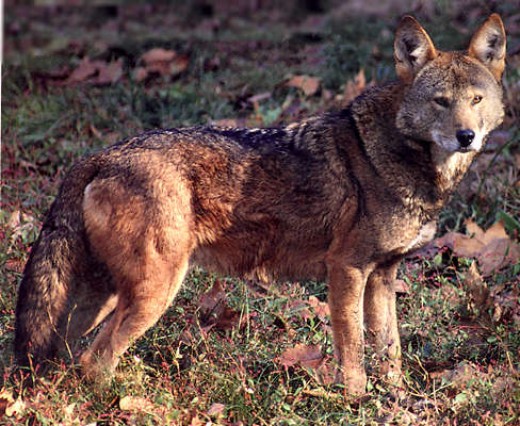
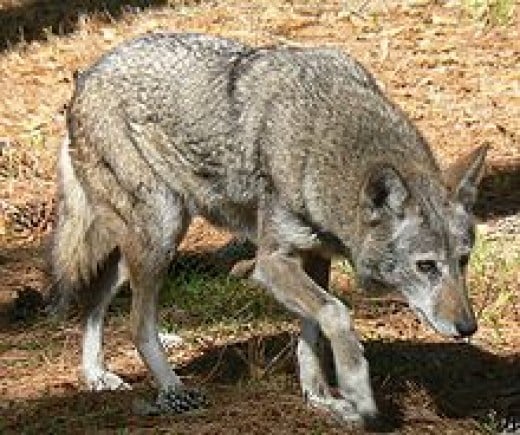
Source
Canis latrans, The Coyote
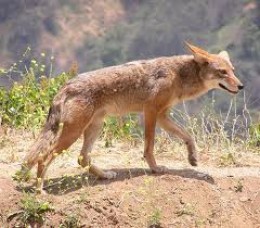
Source
The Red Wolves
The Red Wolf is a rare, and endangered species of wolf that is native to the Southeast,
and Texas; at one point in time the Red Wolf was virtually extinct in
the wild; but has been reintroduced into the wild in some areas. The
primary diet of the Red Wolf is and has always been deer, rabbits,
various kinds of rats and mice, and raccoons. That being the case, the
murder of red wolves is pointless, it's primary interest in food has
never been the rancher's herds, but that has never stopped ignorant, and
fearful men from killing these beautiful animals off whenever possible.
The Red Wolf is a much smaller animal than the Gray Wolf, Arctic Wolf, or Mexican Gray Wolves are; the male Red Wolf typically reaches about 80 lb maximum, whereas the gray wolves, in males, sometimes reach a weight of 120 lbs.
The Red Wolf is a much smaller animal than the Gray Wolf, Arctic Wolf, or Mexican Gray Wolves are; the male Red Wolf typically reaches about 80 lb maximum, whereas the gray wolves, in males, sometimes reach a weight of 120 lbs.
The Red Wolf
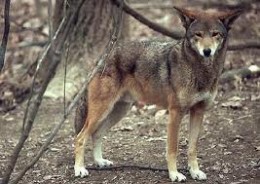
A Female Red Wolf. | Source
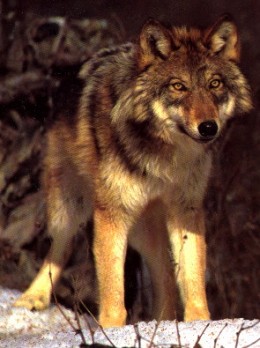
A Male Red Wolf | Source
Red Wolves of East Texas.
Distribution
in Texas. Formerly, red wolves ranged throughout the eastern half of
Texas but their numbers and range quickly declined under pressure of
intensive land use in the region. Also, early lumbering and farming
practices allowed the coyote to expand its range into East Texas; hybrid
offspring of interbreeding red wolves and coyotes more closely
resembled coyotes and the genetic identity of the red wolf was gradually
suppressed.
In 1962 Howard McCarley, who had assiduously searched for them in East Texas for several years, held the opinion that they no longer occurred there. John Paradiso reported in 1965, however, that seven specimens taken near Anahuac (Chambers County) in 1963-1964, and one specimen from Armstrong (Kenedy County) taken in 1961, were definitely red wolves. All of the recent, so-called red wolves we have examined from eastern Texas have proven to be large coyotes. It appears that in Texas, red wolves are now extinct.
Despite the claim above, I'm pretty certain that I've seen exactly ONE Red Wolf right here in Kaufman County. We've coyotes galore here, and those are more often heard than seen, but I saw an animal once years ago that was not a dog, and was far larger than a coyote, I'm positive that I saw a wolf. Also, I know for a fact that a man raises wolves in a nearby rural area, and he's raised some Reds along with Gray's, and he sells them at about 95% pure, as pets to interested persons, so perhaps I'd seen an escaped wolf, or maybe I'd seen a bred in captivity wolf that had wandered away for a bit, or had altogether returned to the wild. It's impossible to say.
Red wolves are different to Gray Wolves in another way, where Gray Wolves will kill coyotes in times when food is more scarce, the smaller Red Wolves, perhaps as an adaptation to keep their DNA in the grand scheme of life, will interbreed with coyotes. Red wolves have much larger heads, and feet, wider snouts, and a lot more black and reddish colouring in their thicker coats.
When driving about in Kaufman and Henderson Counties, Texas, at dawn, one can sometimes spy coyotes in the fields off of rural roads, and often they are just bigger than coyotes should normally be; and these are the Wolf and Coyote hybrids.
In 1962 Howard McCarley, who had assiduously searched for them in East Texas for several years, held the opinion that they no longer occurred there. John Paradiso reported in 1965, however, that seven specimens taken near Anahuac (Chambers County) in 1963-1964, and one specimen from Armstrong (Kenedy County) taken in 1961, were definitely red wolves. All of the recent, so-called red wolves we have examined from eastern Texas have proven to be large coyotes. It appears that in Texas, red wolves are now extinct.
Despite the claim above, I'm pretty certain that I've seen exactly ONE Red Wolf right here in Kaufman County. We've coyotes galore here, and those are more often heard than seen, but I saw an animal once years ago that was not a dog, and was far larger than a coyote, I'm positive that I saw a wolf. Also, I know for a fact that a man raises wolves in a nearby rural area, and he's raised some Reds along with Gray's, and he sells them at about 95% pure, as pets to interested persons, so perhaps I'd seen an escaped wolf, or maybe I'd seen a bred in captivity wolf that had wandered away for a bit, or had altogether returned to the wild. It's impossible to say.
Red wolves are different to Gray Wolves in another way, where Gray Wolves will kill coyotes in times when food is more scarce, the smaller Red Wolves, perhaps as an adaptation to keep their DNA in the grand scheme of life, will interbreed with coyotes. Red wolves have much larger heads, and feet, wider snouts, and a lot more black and reddish colouring in their thicker coats.
When driving about in Kaufman and Henderson Counties, Texas, at dawn, one can sometimes spy coyotes in the fields off of rural roads, and often they are just bigger than coyotes should normally be; and these are the Wolf and Coyote hybrids.
Modern Problems
The
Red Wolf is another example of an apex predator, a predator that has no
peer in the wild. When fearful and foolish mankind obliterates and
desecrates the populations of apex predators, idiot man throws off the
natural cycles and processes of the food chain in that ecosystem. So,
what we are seeing now in Texas, with over two million feral hogs, is
the farmers and ranchers crying and moaning about problems with hogs
tearing up everything. Why is this happening? Well, it's because the Red
Wolf population, apex predators well know to take down weak and younger
or too old wild boar, have been reduced to ineffective levels.
At some point in time, I like to think that mankind will realize that if he's got an idea, and thinks it's superior to Mother Natures idea, that he'll then do the wise thing, and go see a doctor.
At some point in time, I like to think that mankind will realize that if he's got an idea, and thinks it's superior to Mother Natures idea, that he'll then do the wise thing, and go see a doctor.
Conclusion
Though
the Red Wolf is an apex predator who's territory once ranged from Texas
to North Carolina, it's a very endangered species of animal. Men have
always been fearful of wolves, despite the fact that never in the entire
recorded history of North America has there been a recorded and
documented and proven case of a wolf attacking a human. Originally, when
data was first taken, there were three species of Red Wolf, two of them
are now officially extinct, but the dominant variety is still
critically endangered. The Red Wolf has spread it's DNA, as it breeds
with both Gray Wolves, and Coyotes. There are currently only 300 known
pure Red Wolves left in this world, and over two hundred of those are in
captivity. Please help in any way possible to spread concern, and
support to prevent killings of these beautiful animals by idiot humans.
0 comments:
Post a Comment